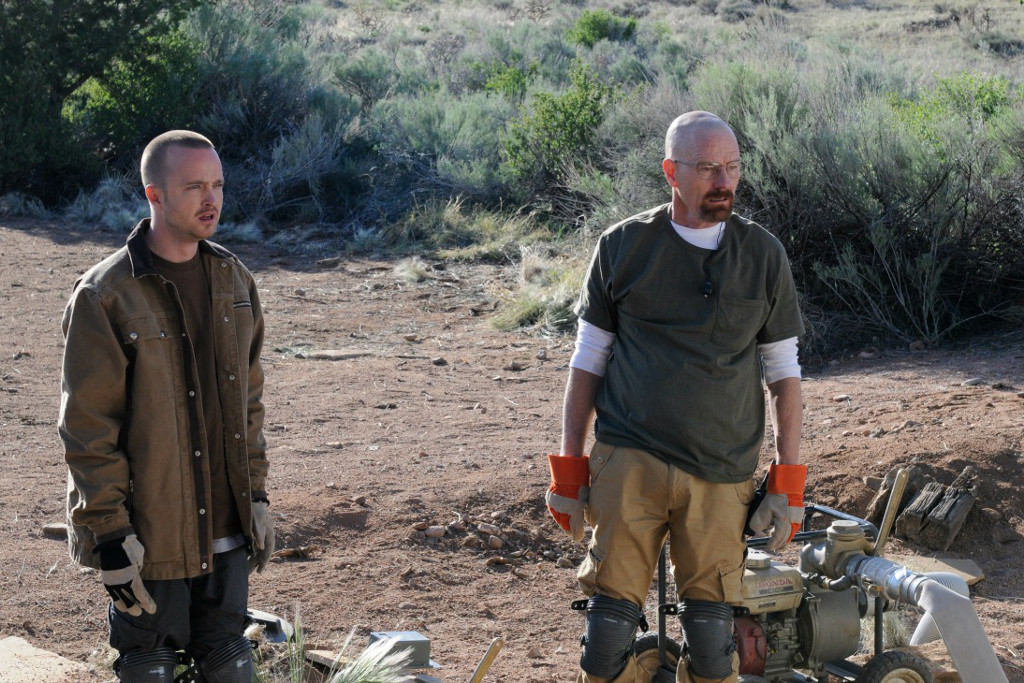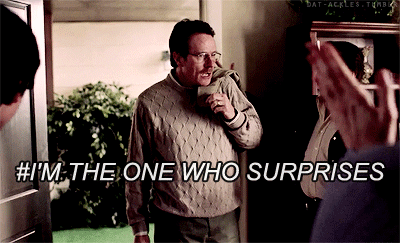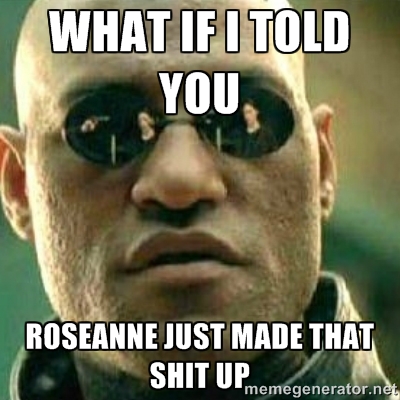What Can Breaking Bad Learn From TV’s Most Iconic Series Finales?
With the series slouching towards its end, we revisit other classic TV endings. Spoilers, obviously.

This article features more spoilers than a motor show. Turn away if you don’t wanna know what happened to Roseanne’s family or Felicity’s hair. Otherwise, welcome!
–
The end of Breaking Bad is almost upon us. Will Walt die? Go to prison? Go into witness protection and start a new life? Only time will tell (specifically, the time it takes America to get to September 29, 9PM central).
What we do know is this: no matter how things wrap up for our ragtag team of meth cooks, wrist-braced bloggers will instantly take to online forums should the show not fulfill their wildly diverging visions for how it should end, whilst also surprising them in unpredictable ways. For just this one episode, I do not envy Vince Gilligan.
For all the talk of television being the ‘new novel’, one thing the two don’t share is TV’s preoccupation with an ending. If you don’t believe me, consider this question: Who remembers how Crime And Punishment ended? No one, probably. But three years after Lost‘s conclusion, all anybody talks about is how god-awful that Sixth Sense ending was. (Spoiler warning! Sorry. That’s going to happen a lot here.)
Every episode of television compels you into the next, so the very last one has to speak for everything that came before it while also providing some reason for the story to stop where it does. If things don’t get nicely wrapped up, the showrunner gets accused of not having a clear vision; if things are wrapped up too nicely, they’ll run the risk of disappointing fans who wanted things to end differently. This is not a catch-22 so much as it’s just a very difficult balancing act, and, as you’ll see below, showrunners have experimented with every kind of conclusion over the past couple of decades, from killing everyone off to basically just shrugging their shoulders and saying “make up your own minds”.
So, while we all await Breaking Bad‘s finale, let’s recap how its predecessors have gone out, if not so much to gleam information about how things could end for Walt (at this point, all we know is that Charlie Rose will appear in the penultimate episode; make of that what you will) as perhaps to just kill time until that AMC logo fades from our screens once and for all.
–
Roseanne (May 20, 1997)
At first glance, Roseanne seemed like just another crass sitcom with no greater ambition than getting all sassy up in your face because, hey, it’s the ’90s. But with its portrayal of a working-class, female-dominated household, the show was something of a feminist sleeper. Alas, it seemed to abandon the blue-collar realism at its heart in its final season, with the Connor family winning the lottery and everyone falling in love. In terms of selling out your ethics, this was bigger than Carrie throwing girl power out the window and shacking up with Big at the last possible minute. Thankfully, the Roseanne‘s very last episode spun that notion on its head.
In a plot point that David Lynch would later employ in Mulholland Drive, the entire final season is revealed to be [record scratch] the denial fantasy of a grieving Roseanne who — unbeknownst to anyone watching — had lost her husband Dan to heart failure. The thing ends on a sharp tonal shift, with the usually outspoken matriarch alone at a typewriter, writing about how she made the whole last season up because she missed Dan. Cut to a quote from T.E. Lawrence about following your dreams, fade to black, and WTF.
Over a decade later, when asked what would have happened to the Connors in an updated spin-off, Roseanne stated that DJ would have died in Iraq and that the family would have lost their house. Probably best we left them when we did.
–
Twin Peaks (June 10, 1991)
America’s weirdest primetime hit formally ended about a half a season after its raison d’etre did (Bob killed Laura Palmer. Or her dad did. Something like that.), which according to the ratings was half a season too late. Agent Dale Cooper would stay on to resolve connected mysteries, and the show chugged along as a tangentially-related soap opera, but whatever it was that compelled Middle America to tune in each week had long dissipated.
While the show’s ratings decline was shocking at the time, in the context of Lynch’s career it’s probably something of a correction: sure the guy had mainstream sensibilities, but they were only ever surface-level. The series would formally end on a desultory ‘cliffhanger’ involving Agent Cooper squeezing toothpaste down a sink and becoming possessed (or something), but no one cared.
Still, if the number of Black Lodge-themed parties and retrospective appraisals of the critically-panned Fire Walk With Me are anything to go by, it may all just have been a case of Lynch being ahead of his time, even though at the time it seemed like he was behind it.
–
Felicity (May 22, 2002)
If you stopped watching when Felicity cut off her hair, you may have been led to believe that Felicity was a run-of-the-mill, mildly popular drama about a young woman who follows a boy to New York instead of not doing that. Which it was, until the series’ final four episodes when Felicity meets a witch and travels back in time to do it all differently (read: try it on with different boys rather than, say, not cut her hair or perhaps WARN EVERYONE ABOUT 9/11).
It all winds up with Flic getting together with the very guy she followed to New York in the first place, bringing the series to a conclusion that’s at once baffling and totally predictable. Also: lamest use of time travel ever.
–
Deadwood (August 27, 2006)
After just three foul-mouthed seasons, things for the inhabitants of our lawless South Dakotan town were cut drastically short: despite critical acclaim, a bunch of Emmys and a Golden Globe, no one was watching and HBO cancelled the dang thing without giving showrunner David Milch the chance to close the arch he’d been wrestling with since episode one. The show finishes on something of an unintelligible whimper, with asshole-about-town Al Swearengen (an appropriate moniker if ever there was one) scrubbing a saloon floor. Not exactly riveting stuff.
Endings matter in television, and without one this otherwise Golden Age-worthy show hasn’t been able to establish itself amongst the canon. It’s as if by going out on such an unintentionally ambiguous note the entire series is rendered less readable, more opaque and troubled than it ought to. At the time, HBO hinted that a feature film wrapping up all the loose ends might be in the works, but it’s been eight years and counting now. Perhaps Milch should give Netflix a call.
–
The Sopranos (June 10, 2007)
When the screen cut to black midway through a seemingly uneventful family dinner, there were three possible conclusions to draw: Tony died, Tony lived, or your TV was broken (enough people believed this last one — 364,000 per second, apparently — that HBO’s website crashed under the traffic of irate and confused complaints). Six years on and the only thing we know for sure is that your antennae’s reception was just fine.
Convincing arguments have been made for the remaining two interpretations — in the ‘Tony died’ camp, we have this 22,000 word treatise, while the ‘No he didn’t’ camp offers this slightly less garrulous one — and David Chase himself has basically told people to shut up about it.
While the ending was confounding enough at the time to annoy legions of fans, history has been kind on the ambiguity. For one thing, it permits fans to believe that Tony got his comeuppance, while also allowing Chase to give the finger to everyone baying for Tony’s blood. It also famously features Journey’s ‘Don’t Stop Believin’’, which doesn’t hurt.
–
Six Feet Under (August 21, 2005)
The anti-Sopranos. What HBO’s mob drama lacked in closure, Six Feet Under made up for with all of the closure. Literally, everyone dies. It could have all been a sappy grab-bag of American Beauty-esque schmaltz (god knows most of seasons four and five were), but Allan Ball miraculously pulls off a six-minute death montage that’s somehow not the cloyingly maudlin lame-fest it should be. (It’s also the thing that brought Australian singer Sia to the world’s attention, so it’s not entirely without fault.)
Aside from providing a cathartic ending to the show that more-or-less catapulted television into its ‘Golden Age’ (most people site The Sopranos as the Age’s first product, but most people are wrong), the closing sequence also serves as an effective way to test whether your tear ducts still work.
–
The Simpsons
Jk. We wish. Let’s just say it ended with Frank Grimes and we’ll live in our own Roseanne-esque fantasy.
–
Chris Harrigan is the editorial assistant at Smith Journal and friend-at-large for TheThousands. He tweets @TheRealChirsp, but wishes he could change that handle because it’s stupid.

